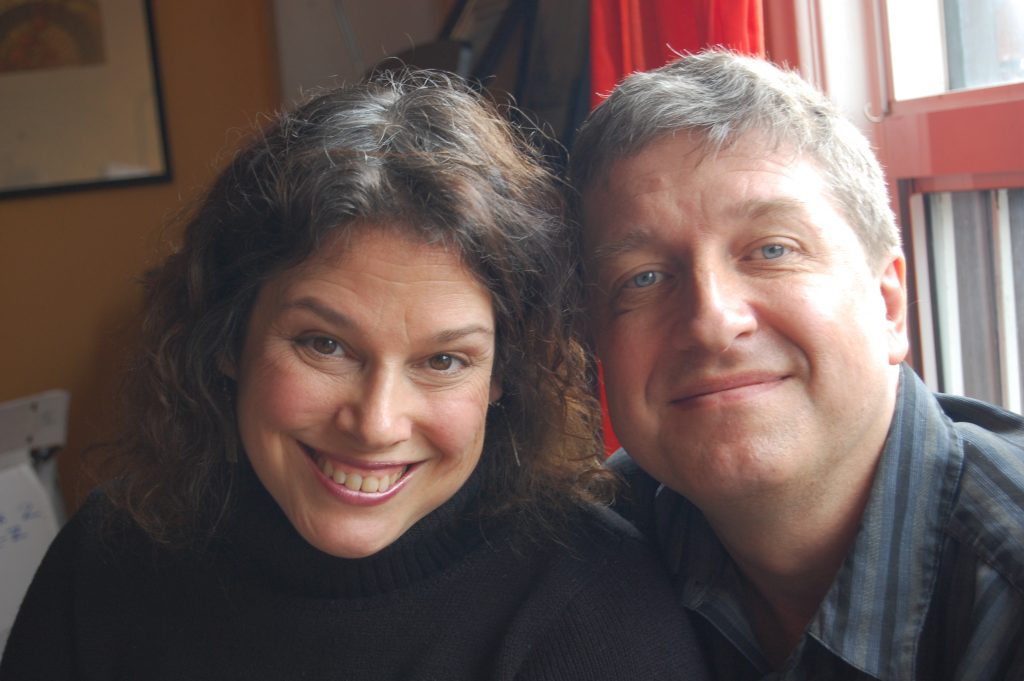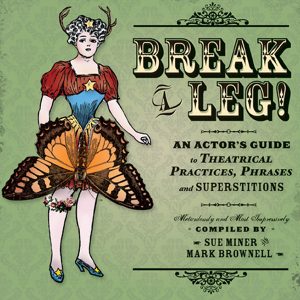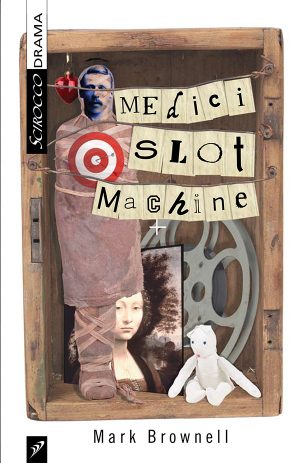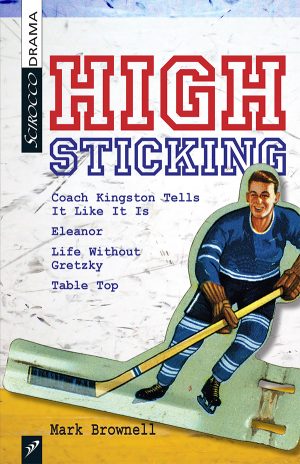Posted January 18, 2022
The Interview – Mark Brownell and Sue Miner
Mark Brownell and Sue Miner
Mark Brownell and Sue Miner, theatre practitioners and educators who are also life partners and the co-artistic directors of Toronto’s Pea Green Theatre. Sue made the shortlist for the Siminovitch Prize for directing in 2007, and she has twice been named one of NOW Magazine’s “Top 10 Theatre Artists.” She is currently the Program Director at George Brown Theatre School. Mark is an award-winning playwright and librettist, the author of Monsieur D’Eon Is a Woman, High-Sticking, Medici Slot Machine, Clique Claque, and War of the Clowns, and librettist for the opera Iron Road. He teaches at George Brown Theatre School, the Toronto Film School, and the University of Toronto School of Continuing Studies.
Since it may be a while before many of us will be able to attend theatre again, could you each tell us one favourite memory of a night in the theatre?
MARK: Theatre is one of those art forms that has intense peak experiences. Live performance is always thrilling for us both on stage and in the audience. Many people don’t like opening nights but we love them because they provide us with an incredible creative rush when the audience applauds at the end of a great performance. (They don’t have to do that, you know.) For us, there is no better feeling than that.
SUE: In our third year of theatre school we created a clown show that was going to tour local schools. Our opening night, however, was to the student body and teachers in the NTS gymnasium. The show started with one of us hiding backstage, waiting for a sound cue to run out and introduce the show, which in turn cued the rest of us to run in from the back of the gym to fantastic klezmer music and say hi and interact with the audience before getting up on stage to do our acrobatics and such. But on this first night we had no idea that SO many people would show up and they had to hold the house. Unfortunately, nobody had conveyed this to the student hiding backstage so when she heard a certain sound cue she just ran out and introduced the show. And frantically ran around the stage hoping upon hope that we might join her. We were all chatting happily in the dressing room down the hall when the stage manager ran in and screamed “DON’T ASK QUESTIONS! JUST GET ON STAGE!” And this, throughout my entire life and career in the theatre, has been my motto.
The two of you have been a dynamic duo on the Canadian theatre scene for a while now. Can you tell us about how you first met and got to know one another?
SUE: We met on the very first day of theatre school in 1980. I was coming straight from high school and Mark had done a year at Queen’s. The summer before I had a job at Ontario Place and met some people who had gone to high school with Mark. They described him as “weird.” This made me happy because I didn’t like them particularly, so I was intrigued at who they would consider weird. On the first day of school we all gathered and his was the first name called, being a “B.” I was a smidge disappointed as he looked normal and lovely to me, but I made a beeline for him first chance I got on the school tour, which was the library.
MARK: We first met in the library at the National Theatre School in Montreal and we bonded as friends and classmates in our first year of study. Our class was quite small so we spent a lot of time together—teachers paired us up in a lot of scenes. It being Montreal, love soon followed.
Your book, Break a Leg, is a fun introduction to theatre terms and traditions for students and others just beginning a theatrical career. Can you tell us about the genesis of the idea for the book?
MARK: Sue was teaching Continuing Education at Central Tech and was working with students who didn’t really have a background in theatrical nomenclature. She would say something like, “Everyone needs to be off book by Thursday” and then she would be met with blank stares. So she began compiling a list of phrases unique to the profession to give them as a gift upon finishing the course. That list soon grew very large and we both stumbled on the idea of publishing this in an entertaining way; adding strange little theatrical quirks and superstitions that we had both picked up over the years. We were fortunate enough that Scirocco Drama was interested in publishing Break a Leg and it has certainly been one of our bestsellers over the years thanks to their guidance and support. That said, we have a copy of the book that is there for us to add things to as we learn more about theatre and its traditions.
Sue, you are the Program Director at the George Brown Theatre School, and Mark, you’ve taught various courses in playwriting and theatre history at schools including George Brown, U of T, the Toronto Film School. Why do you like teaching, and how does it inform other areas of your theatre practice?
MARK: We like teaching because students bring new energy, creativity and curiosity to the work. This is very nourishing for us as creators and keeps us going. As with most artists, there are great challenges we face working under the current COVID protocols. But the students are still the students — they always bring an amazing vitality; they really want to work in theatre even under these difficult circumstances. This attitude is energizing for us as well and we have been very privileged to work with graduating students professionally once they embark on their own careers.
SUE: I love teaching, as it gives me a chance to make theatre or focus somehow on theatre every day. It is a great privilege, which I never take for granted. (I also taught at TFS, Sheridan and Continuing Ed at TDSB for many years leading up to the George Brown gig.)
With your theatre company, Pea Green Theatre, you have collaborated over the years on many projects, with Mark as playwright and Sue as director. Can you tell us a little bit about the benefits—and challenges—of being both life partners and creative partners?
MARK: The general belief in theatre is that couples who are both in the business tend to break up over time. This was not the case with us. When we graduated we both faced challenges when working apart. For example, one of us might be working long distance for a couple of months. That’s never a good recipe for staying together. After two years out of theatre school we made a decision to work together on projects so that we could be together as a couple. So that artistic decision was matched with a personal life decision. We soon established a kind of artistic shorthand when working together. We also really enjoyed creating new works and that is how our company was founded. Sue stepped into the directing role while we were working on an early show and Mark eventually shifted into playwright mode in order to generate content for the company. There was an old trope back in the day that you should never pay to produce your own work – i.e. always use someone else’s money. We discovered that simply wasn’t possible given the economic climate at the time and the lack of financial support from government and established theatres. So we did it ourselves to start and soon found that our services were in high demand by others on more established projects. If we hadn’t produced our own work at the start then we wouldn’t have lasted long as artists.
SUE: Yes, and to add to what Mark said, when we made that decision to stay in the same city rather than take work away I had no idea at the time I was even interested in directing. In fact, I remember feeling quite at a loss knowing that I loved theatre but didn’t have a place in it. My first time directing was in response to a need and I jumped into it with no thought whatsoever. “I’ll do it!” This quick response changed my artistic life forever and I thank Mark for writing such a great play where I could jump in like that.
Tell us about some of the plays that you use in classes with students and why you think students connect with them.
MARK: We were both involved with producing and studying Canadian theatre over the years. The thing is, there has been a real revolution in Canadian plays in the last decade or so. We believe it is important to study and produce older works but, given the multicultural face of our country, there was bound to be a break-out of new Canadian voices that deserved to be heard. Publishing companies like Scirocco Drama are leading the charge in this revolution. Thanks to Scirocco we have both been introduced to a marvelous diversity of talented playwrights such as Marcia Johnson, Marie Beath Badian, Kenneth Williams, and Yolanda Bonnell.
Sue: Yes! In fact, I have been inspired to buy the plays and use scenes I have heard read at Scirocco book launch nights.
Do you have one piece of advice for young people who are beginning their theatrical careers?
MARK: Choosing theatre as a career is very challenging in the current climate. We often joke that we stayed in theatre because we really didn’t have a choice. We are driven to do it. Theatre students need to realize that you must maintain two opposing attitudes if you are to succeed. You will be met with a lot of rejection as an artist—so you must always be protective and mindful of your self-worth. At the same time, however, you must cultivate vulnerability as a performer and be open to challenging new ideas and emotional states. Those two factors often run up against each other in this business.
SUE: I feel one goal is not to feel one has to know all the answers but rather to cultivate the muscle of curiosity to learn to ask questions. That treasure hunt is the fun part. Also to embrace the foibles and incongruities/inconsistency of characters. We love seeing characters who have to struggle and figure things out. Also, that it is okay to take lessons, even after leaving school. No one has to know it all, and if they do, maybe find something else to do. I also try to convey to students that the theatre has been going on for a long time without us and will continue without us, so to make sure that whatever time we have on any stage is a contribution to something much bigger than ourselves.




